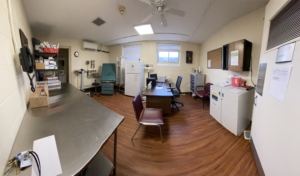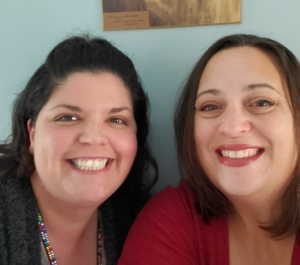The following article appears in the spring 2020 issue of the Joseph’s Journey newsletter. Read the full newsletter here.
2020: Aging and Homelessness
Positioning Joseph’s Home to Better Serve the Growing Medical Needs of Our Residents and Alumni
Across the country, researchers are learning that the population of people experiencing homelessness is aging, much like the population as a whole. However, there are some key distinctions. Issues of aging present much earlier in people experiencing homelessness, and the stress of homelessness and poverty takes a heavy toll on health outcomes. Therefore, we are seeing men enter Joseph’s Home at older ages, often with co-morbidities and even frailty. We understand that as we venture into the next 20 years of our ministry, we must respond to evolving community needs, such as aging. With this in mind, we have made some changes to our program that will position us to meet the needs of residents and alumni to come.

Photo taken after renovation of the health care clinic at Joseph’s Home.
A Renovated Health Care Clinic
In 2019, we were fortunate to receive funding from a number of generous donors to enable the renovation of the Joseph’s Home Health Care Clinic. The clinic is open five times each day for medication dispensing, three times per week for nursing care and vital checks by Care Alliance nursing staff, and on an as-needed basis (i.e., if a resident needs bandages, to weigh themselves, etc.). With the expansion, the clinic serves as a hub for referral sources and community partners to deliver services to the residents, such as VA screenings, in a more comfortable and private setting. The clinic is a place where residents are free to ask questions, knowing that they’re going to get the answers they need at a pace they understand. In addition, we have focused on training and hiring staff to better equip us to address the growing needs of residents and alumni as they learn about their medical conditions, build connections with caretakers, and prepare to perform self-care once they have secured permanent housing.
Teaching Self-Managed Care
In January, Respite Care Manager Raven Kauffman began a course to become a Community Health Worker, which is designed to increase her knowledge and skills as they relate to health care, communication skills, advocacy, health education, and social services to the populations Joseph’s Home serves. This co-curricular 16-week program, taught by health care professionals, teaches students to become a trusted liaison between health and social services and the community to facilitate access to services and improve the quality and cultural competence of service delivery. Through the program, Raven became certified to teach Chronic Disease Self-Management to members of the community who struggle with caring for themselves and their own chronic illnesses. Raven will be implementing this practice at Joseph’s Home to better serve our men by disrupting the cycle of homelessness through outreach, community education, informal counseling, social support and advocacy.

Respite Care Manager Raven Kauffman (left) and Health Care Navigator Carrie Hetsler (right)
Joseph’s Home also welcomed a new health care navigator, Carrie Hetsler, to the staff. Carrie has a bachelor’s degree in psychology from Mt. Vernon Nazarene University and has worked in the field of corrections since 1997. “I am thrilled to be part of this ministry and hope to be a giant asset in the role of the health care navigator,” said Carrie. In her role, Carrie is responsible for:
- Helping the residents link with and engage in medical treatment, including maintaining medication compliance;
- Developing education curricula related to medical processes, the whys and hows of illnesses and, most importantly, of improving and gaining their health; and
- Networking with outside partners to ensure residents stay engaged with their service providers long after they leave Joseph’s Home.


